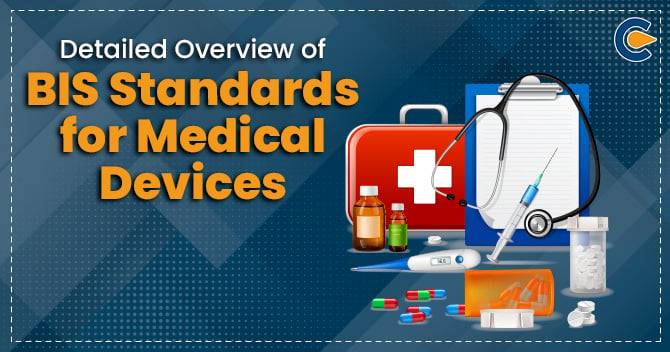The Bureau of Indian Standards, also known as BIS, was enacted in India through an act named the Bureau of Indian Standards Act, 1986. This organisation is a National Governmental Body in India established by the Ministry of Consumer Affairs and the Food and Public Distribution under the authorisation of the Government of India. The purpose of the Bureau of Indian Standards in relation to medical devices is for the maintenance of the healthcare system and to monitor the quality of devices being used in the medical field for ensuring pertinence the devices are being utilised by following all the safety measures as per authorisation of BIS.
For the purpose of monitoring that the medical devices are being utilised as per the set Indian Standards, there are Technical Committees established by BIS that work under the Medical Equipment and Hospital Planning Department, also known as MHD, for regulation over medical devices such as Surgical Equipment, Implants and Accessories, Equipment needed for assisting the Disabled, Surgical Equipment for Veterinary Purposes, Equipment needed for experimentation other necessary practices for Electromedical and Forensic Science purposes, Equipment utilised in Medical Laboratories, Equipment utilised for Health Informatics, etc.
Advantages of BIS Standards for Medical Devices
The following advantages mentioned below are the advantages stated for the implementation of maintenance of BIS Standards for Medical Devices –
- Incrementation of Efficiency
- Reduction of Costs
- Monitoring the Supply Chain of Medical Devices
- Reduction of Health Risks and Securement of Safety Measures
- Ensuring the maintenance of Medical Devices
- Growth in the Marketing of Medical Devices
- Control over Manufacturing of Medical Devices
- Providing security to the Customer and providing Transparency
- Reduction in any occurrence of Health Hazards caused due to defects in Medical Devices
The Necessity of BIS Standards for Medical Devices
The purpose of the Implementation of the BIS Standards for Medical Devices is for complying in accordance with the set Indian Standards for maintenance of required safety measures and for the reduction of any occurrence of health hazards caused due to defects in medical devices as per the Quality Management System also known as QMS of BIS.
The Quality Management System includes –
- Evaluation of Risk Factors
- Management of the authorisation and control over the production of such medical devices
- Evaluation of medical devices utilised for Clinical Purposes
- Verification of Bio–Compatibility
- The Environmental Risk Factors of the Medical Devices
- Approval of the Electronic Devices being utilised for the functioning of Medical Devices
- Securement of Safety Measures being maintained for the Medical Devices
Implementing BIS Standards For Medical Devices
In accordance with Rule 7 of the Medical Device Rules, 2017, it is specified that for the fulfilment of set “Product Standards” of medical devices, all products need to comply with the set Indian Standards as provided by BIS and the latest updated standards specified by the Ministry of Health and Family Welfare also known as MOHFW[1] that falls under the authorisation of the Central Government of India. In case there is no specific set of Indian Standards specified by BIS or MOHFW, then the medical device is to comply with set standards in accordance with International Organisation for Standardisation, also known as ISO, or the International Electro–Technical Commission, also known as IEC, or any relevant Pharmacopeial Standards. In case there are still no relevant standards found that are applicable, then the product is to comply with the applicable Validated Manufacture’s Standards.
Registration Conditions of BIS Standards for Medical Devices
In the current scenario, there are about thirty-eight types of Medical Devices that need to mandatorily obtain the Importer License by applying through the Form MD – 15 that falls under the authorisation of the Central Drugs Standard Control Organisation, which is also known as CDSCO before any initiation of selling the product in the market for maintenance of the set Indian Standards as per BIS.
From 1st October 2022, the following categories mentioned below of Medical Devices have to mandatorily be registered for the issuance of Importer License –
- Class – A Medical Devices
- Class – B Medical Devices
- Class – C Medical Devices
- Class – D Medical Devices
The other Non–Notified Medical Devices are needed to be mandatorily registered under the applicable licenses that must comply with the following below–mentioned documentation –
- Reference Country Approval
- ISO 13458 Certification of the Manufacturing Facility
Conclusion
Recently, there have been discussions held for the purpose of strengthening the set Indian Standards in accordance with the BIS Department of Pharmaceuticals. The Central Drugs Standard Control Organisation, also known as CDSCO, notified on September 2021 that they had added a specific section dedicated to BIS Set Indian Standards for Medical Devices on their website.
Read Our Article:Regulation for all Medical Devices under CDSCO Directive













